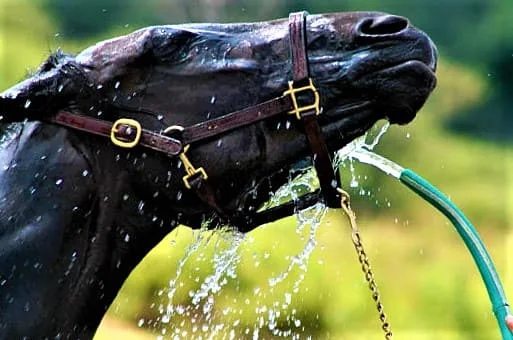According to Duncan Peters, veterinarian doctor, horses sweat to cool down and bring their temperature back to normal. Horses can't regulate their body temperature the way we humans do, but the only way to cool down is to sweat.

When your horse's sweat evaporates
it draws heat away from the skin, helping to cool your horse's body temperature. Without sweat, horses' body temperature will remain elevated, reaching levels that can cause heat stroke. When horses that cannot sweat warm up, their body temperature remains elevated and can reach dangerous levels, putting them at risk of heat stroke. In hot weather, some horses tend to suffer from extreme body heat and therefore increased sweating.
While excessive sweating can lead to dehydration in a horse, a horse that doesn't sweat may be at greater risk because it doesn't have an effective way to remove the heat that builds up in its body. If your horse starts sweating profusely during or after a hard workout, it's possible that the horse's skin has started to sweat excessively to lower its body temperature. Even when combined with the cooling effect of the breath and the loss of radiant heat from the skin, perspiration may not be enough to deal with the horse's elevated body temperature.
It is normal for a horse to sweat profusely after training
but a horse that sweats even when standing up may need help to stay cool and will be happy to be bathed. Not only does movement help manage high body temperatures, but horses have been known to sweat in cooler environments.
If a horse is sweating too much
there are a few things you can do to reduce sweating and make it easier for him to regulate his body temperature in general.
The rate of sweating in horses depends on many factors besides hard work and hot air temperature. The harder a horse works or the warmer the weather, the more sweat is released. A healthy, fit and hardworking horse can produce 12 to 18 liters of sweat after a hard workout.
A horse can lose up to 15 liters of sweat per hour on a mild day during hard work. A horse healthy and exercising on a hot sunny day can lose up to four gallons (15 liters) of sweat per hour. A workhorse dissipates nearly three-quarters of its metabolic heat through sweat. Your horse can produce twice as much sweat as you per square inch of skin.
During intense physical exercise
(cross-country skiing, polo, endurance competitions), he can lose 10 to 15 liters of fluid per hour through sweat and water vapor exhaled with each breath. If your horse's respiration rate remains high, he may be panting in an attempt to cool down, along with excessive sweating. If your horse is producing more heat in your horse's body than he can breathe out, his internal temperature will begin to rise and his sweat glands will send signals to distribute over the skin. Your horse sweats to cool off during hot weather and during exercise or stressful situations such as trailering.
On windy days, sweat evaporates quickly, and even after a vigorous workout, the horse will look dry and sweat-free. Warm water helps remove the sweat residue left on the skin after the horse has cooled. Sweat is good, and it helps your horse get rid of excess body heat.
In other cases, when the weather is not conducive to rapid evaporation, a horse can sweat profusely after a period of exercise. A humid environment further reduces the horse's sweat evaporation and cooling effects. As a last resort, moving the horse to a less hot and humid environment will eventually restore his ability to sweat if conventional treatments fail. Wet blankets with a hose and spread them over a sweaty horse in the stable during downtime, which will help keep her cool until dusk and cold.
horses are unable to produce any sweat
Horses with chronic disease may retain the ability to sweat around the jaw or around the ears, but not in the general area, neck, and chest. In a condition known as anhidrosis, horses are unable to produce any sweat, regardless of the heat and humidity. A horse that sweats little or no sweat may suffer from a health condition called anhidrosis, which can lead to side effects such as shortness of breath, loose skin, fatigue, hair loss, and even a lack of interest in food. Industrious horses sweat during training, and strenuous or prolonged exercise can lead to significant loss of fluids and electrolytes.
In addition, horse sweat is high in water and electrolytes, so when a horse sweats too much, it can lead to foaming at the mouth, fainting, and even death. Horses lose enough electrolytes in sweat not to cause this imbalance so quickly. Because horses have high levels of electrolytes in their bodies, they lose more electrolytes in sweat than can be seen as white foam. The white foam contains electrolytes and is a sign that your horse has lost enough fluid to reach level 5 perspiration.
protein latherin structure surface structure proteins surfactant secondary acid amino solution tryptophan hydrophobic polar peptide restraints exchange fluorescence activity globular resonance serum control relaxation sequence binding allergen intrinsic content apolar droplets solvent layer exposed differences structural quenching structures residues wetting layers material gene biological antibody sequences sex neutron family article model recombinant disulfide aqueous pelt chain patches dynamics breathing salivary peptides terminal natural hydrogen
single chains regions samples data properties reflection function equine molecule analysis interface electronic cutaneous exhibits secretory deuterium weight staining surfaces tension encoding thermoeffector concentration parameters molecular change responses domains buffer backbone wine thermal primers rabbit membrane-derived morphology strands strand fold mechanism adsorption hydrophobins calculated phase study unfolding produced presence anti experiments stress signs women conditions helix
